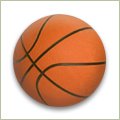
An article that just came out in the Journal of the International Society for Sports Nutrition touts the advantages of eating Wheaties after a workout, saying it helps the body recover from exercise better than a sports drink.
In their recent (May 14) article entitled Cereal and nonfat milk support muscle recovery following exercise, researchers from the Exercise Physiology and Metabolism Laboratory at The University of Texas at Austin examined the effects of eating cereal and (nonfat) milk or a sports drink immediately following exercise on the body's ability to make glycogen (muscle fuel) and protein (a building block for muscle growth).
In the experiment subjects either drank two 20-ounce bottles of a 6% carbohydrate sports drink or ate a bowl (73 grams) of Wheaties with 350 ml nonfat milk (and some additional water).
The subjects then exercised by riding stationary bicycles and blood and muscle tissue studies were performed before and after they ate/drank either the cereal and milk or the sports drink to analyze how well their muscles recovered from the exercise.
The authors concluded that their results "suggest that Cereal is as good as a commercially-available sports drink in initiating post-exercise muscle recovery." and went on to say the "readily available foods such as cereal and nonfat milk can provide postexercise supplementation and be used in lieu of a commercially-available sports drink after moderate exercise. Cereal and nonfat milk provide a less expensive whole food option as compared to sports drinks. It also provides easily digestible and quality protein in the milk, which could promote protein synthesis and training adaptations, unlike a carbohydrate sports drink. This is a potential option for individuals who refuel at home".
OK. I agree with all that they say, but let's take a closer look at the real-world implications.
While this may be an option for people who run/bike and finish their workout at home, not every basketball player is going to be that close to a cupboard and refrigerator when they're out on the court or at a tournament.
More importantly, the authors aren't really comparing eating cereal and milk to the "gold standard" recovery drinks that include protein (and not just carbohydrate-only drinks like in this study).
And what about just plain old chocolate milk?
To their credit, the authors admit that "Although muscle response during recovery to a carbohydrate-protein drink may be similar to that seen after whole-grain cereal and nonfat milk, we chose to compare a carbohydrate-only drink."
Why?
Because "Recreational athletes may be more familiar with carbohydrate drinks due to high product awareness and accessibility, and may not understand the benefit of added protein in post-exercise supplementation."
I think that's taking it a little out there, but it's understandable that a conclusion like this would be reached in a study that was supported by Wheaties and the General Mills Bell Institute of Health and Nutrition.
While this may be true for many recreational athletes, I hope that readers of this blog will know better and will understand the difference between sports drinks that rehydrate and "recovery drinks".
One other implication of using cereal and milk to refuel - it usually takes the stomach longer to process/digest solid foods like cereal than it does liquids. So think twice about eating cereal and milk if you don't have much time between games of a tournament, unless you don't mind cramping up on the court.
All that being said, I think that Wheaties and milk is an excellent option for breakfast (and late night snacks).
Breakfast of Champions? Absolutely.
The best Post-exercise recovery option? I'm not convinced.
P.S. - Congratulations to the 2008-2009 UNC Men's Basketball Team. I guess the Wheaties Box pictured above needs to be updated to 6-Time National Champions (5 men's and 1 women's).











